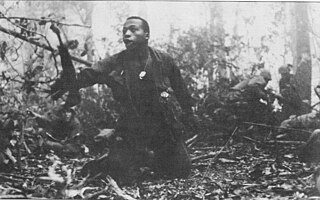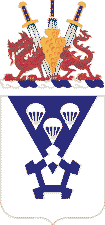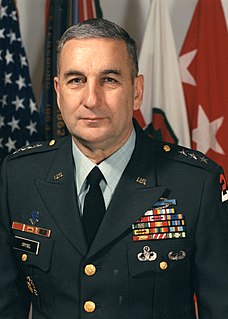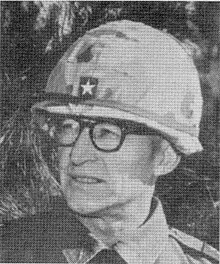
The 101st Airborne Division is a light infantry division of the United States Army that specializes in air assault operations. It can plan, coordinate, and execute multiple battalion-size air assault operations to seize terrain. These operations can be conducted by mobile teams covering large distances, fighting behind enemy lines, and working in austere environments with limited or degraded infrastructure. Its unique battlefield mobility and high level of training have kept it in the vanguard of U.S. land combat forces in recent conflicts: for example, foreign internal defense and counterterrorism operations in Iraq, in Afghanistan, and in Syria, as part of Operation Inherent Resolve.

The XVIII Airborne Corps is a corps of the United States Army that has been in existence since 1942 and saw extensive service during World War II. The corps is designed for rapid deployment anywhere in the world and is referred to as "America's Contingency Corps." Its headquarters are at Fort Bragg, North Carolina.

The battle of Dak To in Vietnam was a series of major engagements of the Vietnam War that took place between 3 and 23 November 1967, in Kon Tum Province, in the Central Highlands of the Republic of Vietnam. The action at Đắk Tô was one of a series of People's Army of Vietnam (PAVN) offensive initiatives that began during the second half of the year. PAVN attacks at Lộc Ninh, Song Be and at Con Thien and Khe Sanh,, were other actions which, combined with Đắk Tô, became known as "the border battles". The post hoc purported objective of the PAVN forces was to distract American and South Vietnamese forces away from cities towards the borders in preparation for the Tet Offensive.

Wayne Allan Downing was a four-star United States Army general born in Peoria, Illinois. He graduated from the United States Military Academy with a Bachelor of Science degree in 1962 and held a Master of Business Administration degree from Tulane University. He also served on the board of directors at a private military company, Science Applications International Corporation (SAIC).

Edward Charles "Shy" Meyer was a United States Army general who served as the 29th Chief of Staff of the United States Army.

David E. Grange Jr. is a retired lieutenant general in the United States Army.

John Russell Deane Jr. was a highly decorated United States Army officer who rose to the rank of general and served as commander of the United States Army Materiel Command.

Larry Rudell Ellis is a former United States Army officer who served as the Commander of United States Army Forces Command from November 19, 2001 until 2004, following his assignment as the Deputy Chief of Staff for Operations and Plans of the Department of the Army.

David Anthony Bramlett is a retired United States Army four-star general who commanded United States Army Forces Command from July 1, 1996 to August 31, 1998, after serving as Deputy Commander in Chief and Chief of Staff, United States Pacific Command at Camp H. M. Smith, Hawaii. During his tenure as Deputy Commander, he was the interim commander of Pacific Command after the commander, Admiral Richard C. Macke, came under fire for comments he had made in regard to the 1995 rape scandal in Okinawa that involved three United States servicemen.

Major General John Uberti is a retired military officer who last served as the deputy commanding general for operations for the U.S. Army's III Armored Corps at Fort Hood, Texas.

The 2nd Battalion, 503rd Infantry Regiment is an active duty airborne infantry battalion in the United States Army, assigned to the 173rd Airborne Brigade Combat Team and stationed at Caserma Del Din, Vicenza, Italy. The battalion has served with the 2nd Infantry Division, the 11th Airborne Division, the 24th Infantry Division, The 25th Infantry Division, the 82nd Airborne Division, the 101st Airborne Division, and the 173rd Airborne Brigade; has been stationed in Korea, Germany, Italy and the United States; and earned campaign credits in World War II, the Vietnam War, Operation Enduring Freedom-Afghanistan, and Operation Iraqi Freedom.
Major General Michael D. Healy was a general officer in the United States Army who spent 35 years serving in the military, completing tours in Korea and Vietnam. Healy began his career with parachute training in Japan, then attended a number of Army Colleges, including Ranger School. He entered the Korean War as a Company Commander with the Airborne Rangers, a newly formed unit of the Army. Most of his career was spent in Vietnam, where he served five and a half tours, leading the 5th Special Forces group for almost 20 months, and earning him his first Distinguished Service Medal.

The 173rd Airborne Brigade is an airborne infantry brigade combat team (IBCT) of the United States Army based in Vicenza, Italy. It is the United States European Command's conventional airborne strategic response force for Europe.

Viet Xuan Luong is a retired United States Army major general. He is the first American officer promoted to general officer rank who was born in Vietnam. He last served the Commanding General for United States Army, Japan/I Corps Forward. He previously served as the Deputy Commanding General (Operations), Eighth Army. His prior assignments included chief of staff of United States Army Central; Director of Joint and Integration, Headquarters Department of the Army, G-8; assistant division commander–maneuver for the 1st Cavalry Division at Fort Hood, concurrent with assignment as commander, Train Advise Assist Command – South, Resolute Support Mission Joint Command, North Atlantic Treaty Organization, Afghanistan.

The 1st Battalion, 503rd Infantry Regiment is an active duty airborne infantry battalion in the United States Army, assigned to the 173rd Airborne Brigade Combat Team and stationed in Vicenza, Italy. The battalion has served with the 2nd Infantry Division, the 11th Airborne Division, the 24th Infantry Division, the 82nd Airborne Division, and the 173rd Airborne Brigade; has been stationed in Korea, Italy and the United States; and earned campaign credits in World War II, the Vietnam War, Operation Enduring Freedom-Afghanistan, and Operation Iraqi Freedom.

Ellis W. Williamson was a United States Army Major General who served in World War II, the Korean War and the Vietnam War. He led the 173rd Airborne Brigade, the first US Army unit to deploy to South Vietnam and later commanded the 25th Infantry Division there.

James W. Crysel is a retired United States Army officer who attained the rank of lieutenant general. He was notable for his command of Second United States Army and the 25th Infantry Division.

Edward L. Trobaugh is a former United States Army Major General.
Robert Charles Forbes (1917–2002) was a United States Army major general who served as commander of the 199th Light Infantry Brigade during the Vietnam War.
Paul F. Smith was a United States Army major general who served as commander of the 173rd Airborne Brigade during the Vietnam War.
















